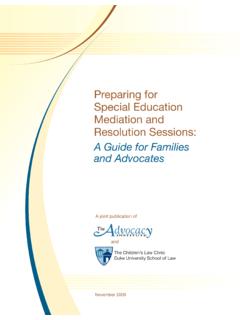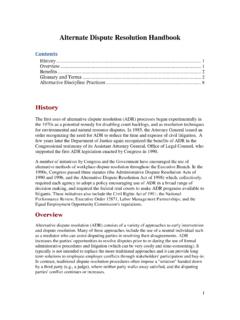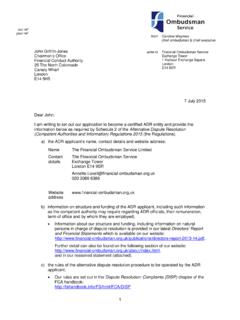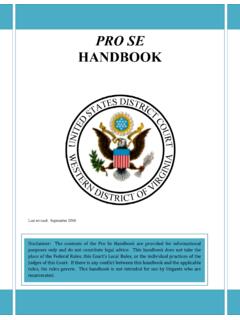Transcription of Preparing for Special Education Mediation and …
1 Preparing for Special Education Mediation and resolution sessions :A Guide for Families and AdvocatesNovember 2009A joint publication ofThe Children s Law ClinicDuke University School of Lawand The Advocacy Institute is a non-profi t organization dedicated to the development of products, projects and services that work to improve the lives of people with disabilities. Founded in 2000, The Advocacy Institute conducts the Advocate Academy, web-based training tailored for advocates and professionals in the fi eld of Special Education . Located in the Washington, metropolitan area, the Institute also provides public policy and legislative services to national organizations, develops and oversees projects related to Special Education law and policy, and produces publications that assist parents and advocates in understanding Education and Special Education law. Learn more at The Children s Law Clinic is a program of Duke University Law School that provides free legal services to low-income children and their parents in matters relating to the rights of children in school and in certain other cases involving a child s health or well-being.
2 Since its establishment in 2002, the Children s Law Clinic has represented hundreds of children from a wide region around Durham, North clinic is staffed by law students learning to practice law under the close supervision of faculty. Clinic students are trained primarily in the areas of Special Education and school discipline. In addition to providing free legal services to children and their families, the clinic staff provides community Education presentations to groups about Special Education , school discipline and the services of the clinic. Learn more at This publication was produced by The Advocacy Institute and the Duke Law School Children s Law Clinic. Copies may be made and distributed for educational purposes without permission. Copies of this publication may not be sold. The Children s Law ClinicDuke University School of LawContents 4 Introduction 5 Terms to Know 6 Preparing for Special Education Mediation and resolution sessions 18 Mediation and resolution Session Flow Chart 19 Comparison of Mediation & Due Process Hearing20 Factors Contributing to Parent-School Confl ict23 An Interview with Art Stewart25 Communication Tips for Building Strong Partnerships 27 ResourcesPreparing for Special Education Mediation and resolution sessions :A Guide for Families and AdvocatesIntroductionThe Advocacy Institute and the Children s Law Clinic at Duke Law School are pleased to offer this publication to contribute to better outcomes for children with Special needs.
3 Through a collection of articles, this guide seeks to provide families and advocates with an array of information that will equip them to make the most of the new and expanded dispute resolution options offered by the Individuals with Disabilities Education Act (IDEA). As the nation s Special Education law has evolved, Congress has consistently sought to provide new ways to encourage informal and speedy resolution of problems. To that end, the 2004 reauthorization of IDEA saw the expansion of the availability of Mediation as well as the addition of the resolution session. In addition to these required procedures, most States are now offering informal early dispute resolution processes intended to diffuse and resolve disagreements before they reach a level requiring a formal process. Strategies to prevent confl ict from reaching formal procedure levels include such things as communication and confl ict resolution skills training for both school personnel and parents, IEP facilitation, parent help-lines, and parent-to-parent support programs.
4 The success of these informal approaches is helping reduce the use of formal processes. This guide provides a comprehensive article on Preparing for Special Education Mediation and resolution sessions , including tips for both families and advocates. A fl owchart of Mediation and resolution session supports the understanding of how these two processes work and intersect. For additional insight, it provides both an interview with a seasoned Special Education mediator and a summary of a study that sought to identify the factors that contribute to parent-school confl ict. Finally, it offers communication tips for building strong partnerships and additional resources for locating further information. We hope these tools will support your efforts to resolve Special Education disagreements in an effective and effi cient manner. Sincerely, Candace Cortiella Jane R. WettachDirector DirectorThe Advocacy Institute Children s Law Clinic Duke Law School The committee is discouraged to hear that many parents, teachers, and school offi cials fi nd that some current IDEA provisions encourage an adversarial, rather than a cooperative, atmosphere, in regards to Special Education .
5 In response, the committee has made changes to promote better cooperation and understanding between parents and schools, leading to better educational programs and related services for children with disabilities. Senate Committee on Health, Education , Labor and Pensions Report 108-185 to accompany S. 1248, a bill to reauthorize the Individuals with Disabilities Education Act, November 3, 20034 Important Terms to KnowDue Process Complaint: A written complaint fi led by a parent or a school district involving any matter relating to the identifi cation, evaluation, educational placement or provision of a free appropriate public Education to a student with a disability. Due process complaints must be fi led within two years of the matter in dispute, unless the state has set a different time limit. Due Process Hearing: A formal, quasi-legal procedure before an impartial hearing offi cer or administrative law judge (or panel of judges) who is not an employee of the state educational agency or school district.
6 Both the parents and the school district present arguments and evidence. Mediation : A confi dential, voluntary process that allows parties to resolve disputes without a formal due process hearing. An impartial mediator helps the parties to express their views and positions and to understand the other s views and positions. The mediator s role is to facilitate discussion and help parties reach an agreement not to recommend solutions or take positions or sides. resolution Session: A mandatory meeting that the school district must convene within 15 days of receiving the parents due process complaint. The resolution session includes parents, members of the IEP team relevant to the complaint, and a representative of the school district who has decision-making authority. If a resolution is reached to resolve the complaint, the parties execute a legally binding agreement which a party may void within 3 business days of the agreement s execution.
7 The parents and the school district may agree in writing to waive resolution session, or agree to use the Mediation process under the Complaint: A written complaint that can be fi led by any organization or individual claiming that a school district within the state has either violated a requirement of Part B of IDEA (the part that contains all requirements regarding the delivery of Special Education services) or the state s Special Education law or regulations. State complaints must be fi led within one year of the alleged violation. 5 Preparing for Special Education Mediation and resolution SessionsJane R. WettachClinical Professor of Law, Duke Law School, and Director, Duke Children s Law ClinicIntroductionThe Individuals with Disabilities Education Act (IDEA) entitles children with disabilities to a free, appropriate public Education in the least restrictive environment. Parents and school offi cials sometimes disagree on what Special Education services and placement a child should receive under this right.
8 Recognizing the potential for disputes, the IDEA provides several dispute resolution mechanisms to help parents and school offi cials resolve differences of opinion. This article describes two of these dispute resolution mechanisms Mediation and resolution sessions and provides advice to parents who utilize is Special Education Mediation ? Special Education Mediation is a process in which a mediator helps to resolve a dispute between a parent and school district personnel over a child s Special Education program. A mediator is a neutral person who will help the participants arrive at a mutually satisfactory agreement. The mediator is paid by the state Education agency, so there is no cost to either the school district or the parents. Parents may request Mediation at any time to attempt to resolve a dispute. Typically, Mediation is attempted prior to the fi ling of a due process petition, but it can be requested following the fi ling of due process.
9 The state Education agency is required to establish and implement procedures for mediator schedules the Mediation at a convenient time and place and facilitates the discussion. Although mediators vary in the way they handle sessions , participants can expect the mediator to help the parties make introductions, defi ne the issues, present their points of view, explore options, and come to an agreement. More specifi cally, the mediator should: Help the parents and school offi cials state their positions clearly and productively; Help the parents and school offi cials stay focused on the relevant issues; 6 Provide a neutral assessment of the strength of each side s position; Separate the parents from the school personnel, if necessary or useful, and become their go-between for communication; Identify areas of agreement and disagreement; Suggest possibilities to each side that might bring them closer to agreement; Facilitate the drafting of a Mediation agreement that resolves the dispute, if the parents and school offi cials have come to an requirements for mediationIDEA requires that state departments of Education offer Local Educational Agencies (LEAs, generally school districts) and parents the opportunity to participate in Mediation to settle any disagreements between them.
10 [20 1415(e); 34 CFR ] IDEA requires state departments to: Maintain a list of qualifi ed mediators who are knowledgeable about Special Education law and trained in Mediation techniques; Compensate the mediators, so that the process is free to both parents and school districts; Establish and implement procedures for facilitating law also requires that Mediation be voluntary on both sides. So, if a parent requests Mediation , but the school district objects to it, then it will not be scheduled. Mediation must not delay a parent s right to go forward with due process if that is what the parent chooses to do, but asking for and engaging in Mediation will not delay the expiration of the statute of limitations for fi ling due process, which is two years or other time limit set by the state. In other words, the clock for the two-year period of time (or other state time limit) in which parents can fi le due process continues to run during any people say in the Mediation session is confi dential and inadmissible as evidence in a later due process hearing or civil court unless it was also spoken in another context where confi dentiality did not apply.










